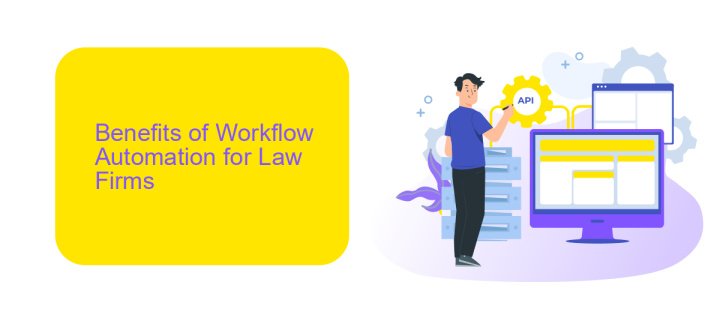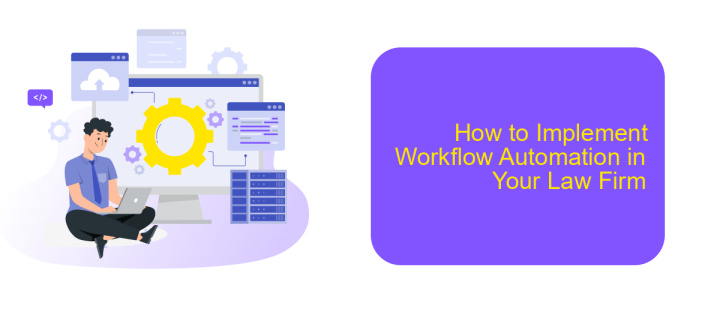Workflow Automation for Law Firms
In today's fast-paced legal environment, workflow automation is becoming essential for law firms seeking to improve efficiency and reduce operational costs. By automating routine tasks, firms can free up valuable time for their attorneys, enhance accuracy, and ensure compliance. This article explores the benefits and implementation strategies of workflow automation tailored specifically for law firms.
Introduction
In the modern legal landscape, law firms are increasingly turning to workflow automation to streamline their operations and enhance productivity. By automating routine tasks, legal professionals can focus on more strategic aspects of their work, ultimately improving client satisfaction and firm profitability.
- Reduction in manual errors
- Increased efficiency and productivity
- Enhanced client communication
- Better compliance with legal regulations
One of the key tools in achieving effective workflow automation is integrating various software and services. Platforms like ApiX-Drive facilitate seamless integration between different applications, allowing law firms to automate data transfer and synchronize their systems effortlessly. This not only saves time but also ensures that all critical information is up-to-date and accessible, thereby supporting better decision-making and operational efficiency.
Benefits of Workflow Automation for Law Firms

Workflow automation offers numerous benefits for law firms, significantly enhancing efficiency and productivity. By automating repetitive tasks such as document management, client communication, and case tracking, legal professionals can focus more on high-value activities like client consultation and strategic planning. This not only reduces the risk of human error but also ensures that deadlines are consistently met, leading to improved client satisfaction and better case outcomes.
Additionally, workflow automation can seamlessly integrate various tools and platforms used by law firms. For instance, services like ApiX-Drive enable the integration of different applications, allowing for smooth data transfer and real-time updates. This integration capability ensures that all team members have access to the most current information, facilitating better collaboration and decision-making. Overall, workflow automation streamlines operations, reduces administrative burdens, and enhances the overall effectiveness of legal practices.
Common Workflow Automation Use Cases for Law Firms

Workflow automation in law firms can significantly enhance efficiency and reduce manual labor. By streamlining various processes, law firms can focus more on delivering quality legal services to their clients.
- Document Management: Automating document creation, storage, and retrieval can save time and reduce errors. Tools like document management systems can automatically organize and tag documents.
- Client Intake: Automation can simplify the client intake process by using online forms and automating data entry into CRM systems. This ensures that all client information is accurately captured and easily accessible.
- Billing and Invoicing: Automating billing and invoicing processes ensures timely and accurate invoicing, reducing the risk of errors and improving cash flow.
- Case Management: Automation tools can help manage case workflows, track deadlines, and ensure that all necessary steps are completed on time.
- Integration of Services: Using integration platforms like ApiX-Drive, law firms can connect various applications and automate data transfer between them, further streamlining their workflows.
By implementing these common workflow automation use cases, law firms can improve their operational efficiency, reduce costs, and provide better service to their clients. Automation allows legal professionals to focus on more strategic tasks, ultimately enhancing the firm's overall productivity.
How to Implement Workflow Automation in Your Law Firm

Implementing workflow automation in your law firm can significantly enhance efficiency and reduce the time spent on repetitive tasks. Start by identifying the most time-consuming and repetitive processes within your firm. Common areas for automation include document management, client intake, and appointment scheduling.
Next, choose the right tools and software that fit your firm's specific needs. Look for solutions that integrate seamlessly with your existing systems. One such tool is ApiX-Drive, which allows for easy integration between various software applications, ensuring smooth data flow and reducing manual work.
- Identify repetitive tasks and processes
- Select appropriate automation tools
- Integrate with existing systems using tools like ApiX-Drive
- Train your staff to use new systems
Finally, monitor the performance of your automated workflows and make adjustments as needed. Regularly review the efficiency gains and gather feedback from your staff to ensure the automation tools are meeting your firm's needs. By following these steps, you can effectively implement workflow automation and enhance your law firm's productivity.
Best Practices for Workflow Automation in Law Firms
Implementing workflow automation in law firms requires careful planning and execution to ensure optimal efficiency and effectiveness. One best practice is to map out all existing workflows and identify repetitive tasks that can be automated. This includes client intake processes, document management, and billing. Utilizing tools like ApiX-Drive can facilitate seamless integration between various software systems, enabling data to flow effortlessly and reducing the need for manual entry.
Another crucial practice is to regularly review and update automated workflows to adapt to changing legal requirements and firm processes. Training staff on how to use automation tools effectively is also essential to maximize the benefits. Additionally, maintaining a balance between automation and personalized client interactions ensures that while routine tasks are streamlined, the quality of client service remains high. Regular audits of automated processes can help identify any inefficiencies or areas for improvement, ensuring that the law firm continues to operate at peak performance.


FAQ
What is workflow automation and how can it benefit a law firm?
Can workflow automation be customized for the unique needs of a law firm?
How secure is workflow automation for handling sensitive legal data?
What types of tasks can be automated in a law firm?
How can ApiX-Drive help in implementing workflow automation for a law firm?
Do you want to achieve your goals in business, career and life faster and better? Do it with ApiX-Drive – a tool that will remove a significant part of the routine from workflows and free up additional time to achieve your goals. Test the capabilities of Apix-Drive for free – see for yourself the effectiveness of the tool.

